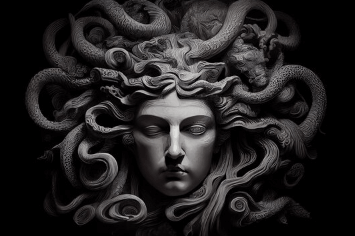Art:99iwn2gfdzq= Greek Mythology:Zz3kn-Vmu6s= Medusa

The figure of Art:99iwn2gfdzq= Greek Mythology:Zz3kn-Vmu6s= Medusa has long captivated artists and scholars alike, serving as a complex emblem within Greek mythology. Originally cast as a fearsome creature, her narrative has undergone a notable transformation, revealing layers of meaning that resonate with contemporary themes of identity and power. This evolution raises pertinent questions about the societal constructs surrounding femininity and beauty, illustrating the tension between monstrosity and empowerment. As we examine her portrayal across various artistic mediums, one cannot help but wonder how these interpretations reflect and challenge our modern understanding of womanhood.
Origins of Art:99iwn2gfdzq= Greek Mythology:Zz3kn-Vmu6s= Medusa’s Legend
The legend of Medusa, one of the most compelling figures in Greek mythology, has its origins rooted in a complex interplay of divine punishment, transformation, and cultural symbolism.
Medusa’s curse, imposed by Athena, transformed her from a beautiful maiden into a feared Gorgon.
This tale intertwines her fate with that of her Gorgon sisters, reflecting themes of jealousy, power, and the consequences of human vanity.
Read More Art:-Ybe-3naftm= Monty Python
Art:99iwn2gfdzq= Greek Mythology:Zz3kn-Vmu6s= Medusa in Greek Mythology
Medusa’s transformation into a Gorgon marks a pivotal moment in her story, positioning her as a central figure in the pantheon of Greek mythology.
Medusa’s symbolism reflects the duality of beauty and terror, while her powers—capable of turning onlookers to stone—serve as a metaphor for the consequences of unchecked desire and fear.
Thus, she embodies complex themes of transformation and retribution.

Artistic Representations of Medusa
Throughout history, artistic representations of Medusa have evolved significantly, reflecting the shifting cultural perceptions of beauty, monstrosity, and femininity.
Symbolic interpretations often portray her as a powerful figure, subverting traditional notions of female vulnerability.
Feminist readings emphasize her transformation from victim to symbol of empowerment, showcasing her serpentine hair as a challenge to patriarchal standards and inviting deeper contemplation on identity and autonomy.
Medusa’s Influence in Modern Culture
In contemporary culture, Medusa transcends her mythological origins to emerge as a multifaceted symbol, resonating across various artistic and social landscapes.
Medusa symbolism embodies themes of empowerment and transformation, particularly within the framework of Medusa feminism. This reinterpretation challenges traditional narratives, positioning Medusa as a figure of resilience and strength, inspiring movements that advocate for women’s rights and autonomy in a patriarchal society.
Read More Clip Art:1q0qh9m6e2u= Usmc Logo
Conclusion
The evolution of Art:99iwn2gfdzq= Greek Mythology:Zz3kn-Vmu6s= Medusa’s representation underscores a profound transformation from a mere monster to an emblem of female empowerment and resilience. This metamorphosis invites a reexamination of societal norms surrounding beauty and identity, as Medusa’s image now embodies both terror and strength. In a world where perceptions shape reality, the serpentine figure of Medusa serves as a poignant reminder that beauty, when intertwined with power, can challenge and redefine the narratives imposed by society.




